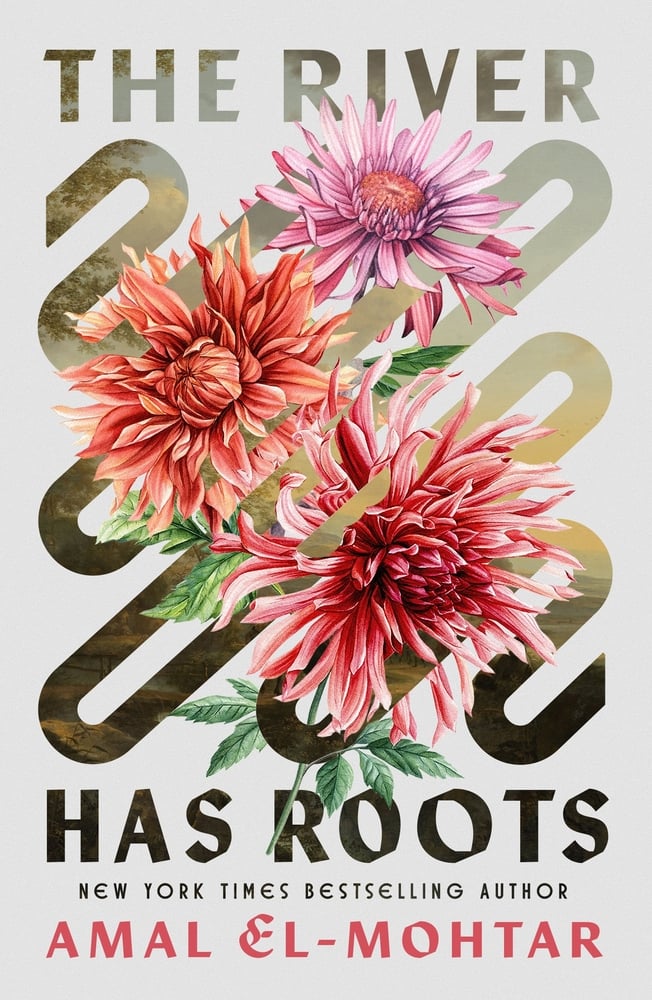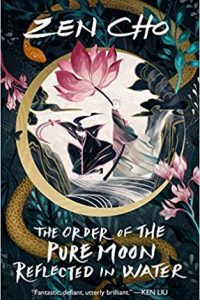The River Has Roots by Amal El-Mohtar: Review by Liz Bourke
 The River Has Roots, Amal El-Mohtar (Tordotcom 978-1-250-34108-2, $24.99, 144pp, hc) March 2025.
The River Has Roots, Amal El-Mohtar (Tordotcom 978-1-250-34108-2, $24.99, 144pp, hc) March 2025.
Amal El-Mohtar is perhaps most famous as the co-author (with Max Gladstone) of the justly lauded bestselling novella This Is How You Lose the Time War. Her independent talents, however, are numerous, and in her new solo novella The River Has Roots, several of them are on display.
The River Has Roots is intertwined with the ballad The Two Sisters (Child 10, Roud 8) like ivy and an oak. In that ballad, one sister murders another out of jealousy for her lover. Here, instead, El-Mohtar delivers a meditation on love – between sisters and between lovers – on language, magic, loyalty, and transformation. It is a meditation suffused in the traditions of English folklore, one that recollects the works of Frances Hardinge, Patricia McKillip, and Terri Windling, of Ellen Kushner’s Thomas the Rhymer and Peter S. Beagle’s The Last Unicorn, but one, too, that seems to me to have cross-pollinated with T. Kingfisher’s more down-to-earth fairytale retellings.
For this is a fairy tale, set on the borders of Faerie, drenched in folksongs. The River Liss flows out of Faerie, along the edge of the town of Thistleford, and along its banks grow willows that sieve the changeable magic of Faerie out through their roots. It is the duty of the Hawthorn family to sing to the willows and to harvest their wood, and the two latest daughters of the Hawthorn line, Esther and Ysabel, are as devoted to that duty as they are to each other.
Esther is two years the elder, dark where her sister is fair, adventurous where her sister is not. On the banks of the River Liss she met a being called Rin, come out of Faerie, and they wooed each other in riddles and gifts. But in Thistleford, a young modern man, Samuel Pollard, is courting her aggressively and tactlessly, seeking the profit of joining the Hawthorn lands to his own inheritance. With a name like Pollard – which, as a verb, means to cut a tree back to the trunk, to keep a tree smaller than it would naturally grow – in a novella so closely invested with language and the poetry of meaning, it would seem he bodes ill for a Hawthorn. And so it proves: He comes upon Esther as she’s returning home from courting with Rin, and drowns her in the River Liss. He will court Ysabel in her stead, and successfully, too.
But the River Liss is a river of transformations and magic, changeable and fierce. At the moment of Esther’s death, it reverses its flow, backwards into Faerie, and casts her up, dead as a mortal woman but alive as a swan, on the shores of Faerie. She cannot return alive to the mortal lands, but her love for her sister has her beseech Rin to transform her to a harp and bring her bones back, to sing the truth of her murder and reaffirm her love for her sister – and her sister’s love for her.
El-Mohtar is a fantastic prose stylist, with an ear for poetry and a very apt sense for rhythm and metaphor, more inclined to the understated than the overblown. Language and character come alive in this novella, and the setting is – like a good folktale, like a ballad – at once recognisably familiar and yet still strange. Thistleford could be any English country village from 50 to 300 years ago, though it is not quite the England that we know. This is the kind of fantasy that – to borrow a line from the close of the novella itself – ‘‘breaks the real into the true.’’ At times elliptically, at times explicitly, this is a story about truths, and change, and choices: about family, and love. It is both haunting and joyful. It made me cry. And then its ending offered a deserved katabasis, warm and loving and generous.
The River Has Roots is a brilliant novella. I recommend it highly. And I expect to see it on award shortlists next year. And, judging by the space left in my galley copy for illustrations, the final physical form will be as striking as the contents.
Interested in this title? Your purchase through the links below brings us a small amount of affiliate income and helps us keep doing all the reviews you love to read!
Liz Bourke is a cranky queer person who reads books. She holds a Ph.D in Classics from Trinity College, Dublin. Her first book, Sleeping With Monsters, a collection of reviews and criticism, is out now from Aqueduct Press. Find her at her blog, her Patreon, or Twitter. She supports the work of the Irish Refugee Council and the Abortion Rights Campaign.
This review and more like it in the January 2025 issue of Locus.
 While you are here, please take a moment to support Locus with a one-time or recurring donation. We rely on reader donations to keep the magazine and site going, and would like to keep the site paywall free, but WE NEED YOUR FINANCIAL SUPPORT to continue quality coverage of the science fiction and fantasy field.
While you are here, please take a moment to support Locus with a one-time or recurring donation. We rely on reader donations to keep the magazine and site going, and would like to keep the site paywall free, but WE NEED YOUR FINANCIAL SUPPORT to continue quality coverage of the science fiction and fantasy field.
©Locus Magazine. Copyrighted material may not be republished without permission of LSFF.









